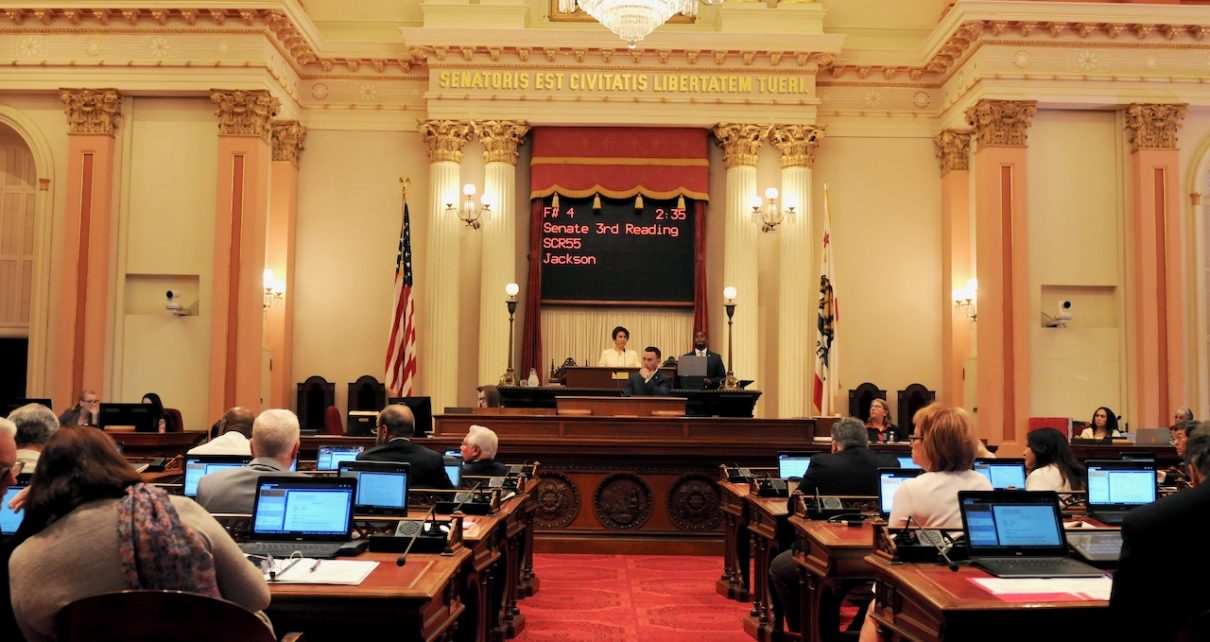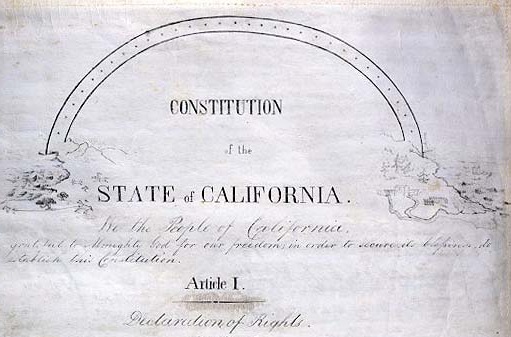
California State Senate. (Photo: Kevin Sanders for California Globe)
Does the Legislature Violate the Separation of Powers Doctrine by Exempting Regulations from the APA Process?
In the California Constitution there is an explicit separation of powers
By Chris Micheli, July 29, 2022 6:23 am
I have previously raised public policy concerns with the Legislature, when delegating part of its constitutional lawmaking authority to the executive branch and its administrative agencies, exempting regulations from complying with the California Administrative Procedure Act (APA). The fundamental goal of the APA is to ensure public notice and an opportunity for the public to comment on the proposed regulations.
The following is an example of language contained in a bill that provides such an exemption from the APA.
(c) The Administrative Procedure Act (Chapter 3.5 (commencing with Section 11340) of Part 1 of Division 3 of Title 2 of the Government Code) shall not apply to any standard, criterion, procedure, determination, rule, notice, guideline, or any other guidance established or issued by the __(insert department)__ pursuant to this section.
Today I raise a legal concern about these statutory exemptions from the APA for certain state agencies and departments and their rulemaking activities: By providing a statutory exemption from the two fundamental tenets of the APA (public notice and comment), does an exemption violate the separation of powers doctrine?
In the California Constitution, Article III, Section 3, there is an explicit separation of powers, rather than a court-adopted doctrine found at the federal level. Section 3 provides: “The powers of state government are legislative, executive, and judicial. Persons charged with the exercise of one power may not exercise either of the others except as permitted by this Constitution.” What does this mean in practical terms?
The purposes of the separation of powers doctrine are to ensure that our state government has power divided among three equal branches and to ensure that one branch does not become dominant. Obviously, the lawmaking power is granted to the legislative branch. The courts in this state, just as the federal courts have done, permit the legislative branch of government to “delegate” a certain amount of their lawmaking power to the executive branch, so long as that “delegation of (lawmaking) authority” meets certain judicial doctrines.
While there are appropriate debates about how much lawmaking authority can be delegated to the executive branch and its administrative agencies that adopt regulations in this state, exempting some of these agencies or some of their specific rulemaking authorizations from complying with state APA statute certainly gives rise to an argument that the appropriate delegation of lawmaking authority is not taking place. In fact, one of the judicial tests – “the adequate safeguards test” – may actually be violated by exempting rulemaking from the APA process.
The rationale behind the “adequate safeguards test” is that the legislative delegation of lawmaking authority to the executive branch must contain limitations on the executive branch and its rulemaking agencies to ensure that the legislative branch’s delegated authority is not violated or used for an unintended purpose or that it might result in an improper regulation that is inconsistent with the underlying statute.
Fundamentally, the procedural rules of the APA are intended to ensure that the executive branch is limited in its exercise of the legislative branch’s lawmaking authority. By simply exempting a state agency from complying with the APA, the Legislature may be violating the separation of powers doctrine. In fact, other states’ supreme courts have ruled that a delegation of rulemaking authority by the legislative branch is unconstitutional if there is not an opportunity for public notice and comment.
State courts in North Carolina and Pennsylvania, among others, have struck down state rulemaking statutes that did not provide an opportunity for notice and public comment, or even a public hearing. When the California Legislature exempts an executive branch agency from complying with the APA, not only does it deny the public and the regulated community from their intended rights of notice and comment, but also it might violate a fundamental constitutional doctrine that provides the basis for our state government – the separation of powers doctrine.
As such, the Legislature should at least consider whether it is constitutional, and whether it is good public policy, to exempt executive branch agencies from complying with the requirements of the APA when the Legislature chooses to delegate its lawmaking authority to the executive branch of state government.
- Stay of Appeals - March 4, 2026
- Liability for a Deceased Spouse’s Debt - March 4, 2026
- Wildlife Management Areas - March 3, 2026





The Emergency Powers Act, which the Governor is still abusing, represents a violation of the separation of powers. The legislature does not have the authority to assign its duties to the executive branch. That law is invalid, and therefore so is Newsom’s endless emergency authority.